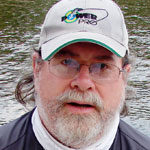
While some readers may not remember Loran C and many don’t remember Loran A, they were the first electronic navigational aids available to recreational boaters.
The transition to Loran C was needed and with it the units became affordable in price and useable in size for the average person who owned a center-console or cuddy cabin boat. They were the forerunners of electronic marine navigation and led the way to our current crop of reliable and affordable GPS marine (and land) navigation units.
While many boaters and fishermen forgot, or never learned, about Loran, the signal towers and transmitters were upgraded. It’s continued to be an excellent means of navigation and was superior to early GPS in several ways.
Even with the continued improvements to GPS, Loran remains superior to GPS in several ways.
However, the continuation of Loran is threatened once again. Loran users could soon be facing a closure of the land-based, low-frequency radio system that has served mariners and aviators for several decades.
The Department of Homeland Security, which is the overseeing agency of the Coast Guard, didn’t include any funding for the continuation of Loran in its 2007 budget. Congress overrode that omission and voted to put the money back in, but only for one year while a study is conducted.
The Coast Guard is requesting public comments about the issue and will soon evaluate the future of Loran.
Fishermen and boaters may submit comments by going to http://dms.dot.gov, clicking on “comment/submissions” and using Coast Guard docket number USCG-2006-24685.
By the late 1980s Loran C was in such widespread use the C was omitted, and boaters/anglers simply referred to “Loran,” an acronym for Long Range Aid to Navigation.
However, technology was evolving and by the mid to late-1990s, many boaters and fishermen had switched to or begun with GPS, which is an acronym for “Global Positioning System.”
Many fishermen and boaters never used Loran or have made the transition to GPS, but it’s an excellent backup system. It’ll also work well as a primary navigation system and is used as such by a surprisingly large number of fishermen.
The repeatability is excellent and generally they can return to within 10 meters of a location saved in their Loran unit. Until Selective Availability, a government-induced timing error to corrupt GPS accuracy, was turned off May 2, 2000, that grade of accuracy was only achieved by differential and WAAS-enabled GPS units.
Differential GPS used multiple land-based stations to determine the SA error and broadcast an AM radio signal to differential receivers, which were connected to GPS receivers that corrected the error. WAAS was also developed to correct the SA error but was different in that it was broadcast via satellites and could use a single channel of a GPS receiver.
A large number of fishermen accepted the new GPS technology grudgingly and retained their Loran units as either their primary or a redundant form of navigation.
In the late 1990s, a number of federal agencies predicted the demise of Loran, but it continued and the system was given a nearly complete overhaul. After listening to fishermen and boaters voice their concerns, money was appropriated to keep Loran going strong through 2006.
Now we have arrived at yet another Loran crossroads. Will we continue moving down the Loran road, even though it parallels the GPS road, or will we switch completely to the GPS road, considering it to be an interstate, and abandon the old road completely?
I don’t know about you, but I still travel the old roads, even sometimes when an interstate is available-and I still have an operating Loran unit. Actually, I have several I’ve collected from boaters who had made the switch and said they weren’t going to look back.
However, when Loran continued to be available and accurate, a couple people called and asked if I might consider selling their old forsaken Loran units back to them.
There are many reasons fishermen and boaters should want Loran to be continued. The most common is as back-up to GPS. Perhaps you might remember the government was doing some interference testing on GPS signals during the 2004 Big Rock Blue Marlin Tournament. A notice was posted at the “Coast Guard Notice to Mariners” site several weeks in advance, and Loran sales were especially brisk on e-bay for several weeks.
Many skippers, who had forsaken Loran, used it again to find their favorite spots that week.
Many older fishermen have logs of fishing coordinates in Loran coordinates and feel comfortable with their Loran units and know how to use them to achieve the results they want.
How many of us have problems operating a complicated cable or satellite remote control for a television, VHS or DVD player or recorder? I don’t know about everyone else, but I need to feel confident and comfortable when using navigational equipment.
Loran is almost another language off the N.C. coast; I expect the same is true at other locations.
From Cape Fear northward, an experienced fisherman can tell another experienced fisherman his location by giving the water depth and the last three numbers of the 39000 TD line. Off the central N.C. coast, the 39000 series TD lines cross the 30, 50, and 100 fathom lines nearly at a perfect 90 degrees.
A position of 100 fathoms and the 650 line would indicate a location north and offshore of the Big Rock, while 30 fathoms and the 440 line would indicate a location just inshore of the Swansboro Hole.
This is a language originated and spoken by the older experienced fishermen from this area. If you don’t think the seasoned fishermen speak and understand this language, you should spend a day near the Swansboro Hole, Big Rock or Rock Pile with your VHF radio set to scan.
Many GPS units operate in Loran coordinates but receive the GPS signal and compute the Loran positioning. There are a few units that do this pretty well, but it’s a logarithmic equation and there are errors.
Besides, these units don’t actually operate as a Loran; they merely simulate being a Loran. If the GPS signal isn’t clear, they either won’t work or produce large errors.
“With the GPS signal being relatively weak, there’s concern it’s susceptible to jamming, which could present national security problems if it’s the sole navigation system for the U.S.,” said Elaine Dickinson of BoatU.S. Government Affairs. “Testing has shown Loran to be virtually jam-proof. There’s a strong case to be made for keeping Loran as a relatively low-cost, ground-based backup to satellite-based GPS.
“Shutting down Loran just doesn’t make sense.”
Dickinson said the Coast Guard just spent $160 million to modernize and largely automate the Loran system.
Thousands of mariners and aircraft pilots still use Loran receivers.
While none of the marine electronics manufacturers continue to manufacture a stand-alone Loran receiver (Furuno did until 2006, when a parts availability issue caused it to end production of its LC 90 Mk II), Si-Tex recently released an antenna that receives e-Loran and GPS signals. The unit is named the e-LORAN Integrated GPS/Loran Receiver Sensor. The Si-Tex antenna is only compatible with specific Si-Tex GPS units.
The North Koreans recently shot down one of their satellites, so why couldn’t they take out one of our GPS satellites? Surely it’s possibile and would erode the accuracy of GPS.
Can we think of GPS as a grid of perfectly-timed traffic signals on a busy road? Traffic moves along well as long as everything is working. However, as soon as one signal isn’t functioning, the system breaks down, and we have to call the police to direct traffic.
Think of Loran as those traffic cops. Let them sit around and not do much until they’re needed, but I sure like getting them on the scene quickly when we need them.
I believe we’d all be surprised to know just how many fishermen, boaters and aviators use Loran regularly.
Everyone should visit the web site and submit comments regarding the future of Loran. It’s really simple. I’ve made my comment and it was assigned tracking number 444069.
Log onto http://dms.dot.gov, then click on “comment/submissions” and use Coast Guard docket number USCG-2006-24685 to access the Loran comments section.




Be the first to comment